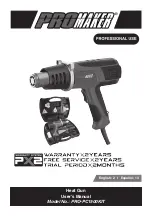
15
o
Coil Nailer
Drives Plastic Sheet Nails (1¼" to 2½" / 32 to 65mm)
or Wire Weld Nails (1¾" to 2½" / 45 to 65mm)
Model No. CN565-15
Item No. 65555
16
Interchange Brands
Operator’s Manual
Maintenance and Inspection
Read the section titled SAFETY.
SERVICE AND REPAIRS All quality tools will eventually require servicing or
replacement of parts due to wear from normal use . It is recommended that these
operations should be performed by a professional technician .
NOTE:
The information contained in this Manual is designed to assist you in the
safe maintenance of the nailer . Some illustrations in this Manual may show details or
attachments that are different from those on your nailer .
WARNING:
Disconnect air hose and remove nails from nailer when:
Doing maintenance and inspection
Clearing a jam
Inspecting the magazine
1 . DISCONNECT AIR HOSE .
2 . Clean the magazine . Remove dust which may have accumulated in the
magazine .
3 . Lubricate the nail rail with nailer lubricant .
Clearing a jam
Remove a jammed nail in the following order:
1 . DISCONNECT AIR HOSE .
2 . Remove all nails .
3 . Remove the jammed nail with a slotted head screwdriver .
4 . In case of frequent jams, contact an authorized service center .
A qualified person should perform repairs and maintenance.
Periodic maintenance to be performed:
Check that the piston bumper is operating normally . A damaged piston
bumper may cause damages to other component parts .
Check o-rings for wear or damage . Damaged o-rings may affect overall
performance .
Make sure all screws are secure . Loose screws may affect overall
performance .
When repairing a tool, make sure the internal parts are clean and lubricated .
Storing
When not in use for an extended period, apply a thin coat of the lubricant to
the steel parts to avoid rust .
Cold Weather Care
Do not store the tool in a cold weather environment .
Keep the tool in a warm area until beginning the work .
If the tool is already cold, bring it in a warm area and allow the tool to warm
up before use .
1 . Reduce the air pressure to 60 to 80 psi ﹙4 .2 bar 4 .2 kgf/cm2﹚ .
2 . Remove all fasteners from the tool .
3 . Connect the air hose and free-fire ﹙blank-fire﹚ the tool .
The lowered air pressure will be enough to free-fire the tool . Slow speed operation
tends to warm up the moving part .





































